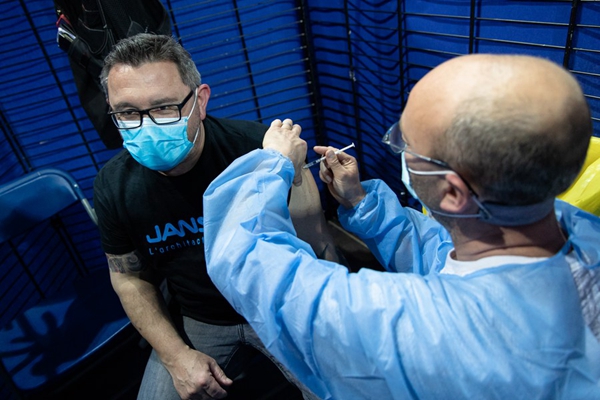
A man receives the COVID-19 vaccine in a COVID-19 vaccination center at the National Velodrome de Saint-Quentin-en-Yvelines in Saint-Quentin-en-Yvelines, France, March 24, 2021. [Photo/Xinhua]
To slow down the coronavirus spread and pave the way for a gradual return to normalcy by mid-May, schools in France will be closed for three weeks and restriction on people's movement, already in force in many regions, will be extended to the whole territory, President Emmanuel Macron announced on Wednesday evening.
Starting from Monday, students, except the children of medics, will move to remote learning for one week before going on two-week holiday.
Thereafter, the country's nurseries and primary schools will reopen from April 26, while middle and high schools will be allowed to return to the classroom from May 3. University students will be allowed to go in for only one day a week.
"It is the best solution to slow down the virus while preserving education and the future of our children," Macron said in his televised address to the nation. "School is non-negotiable."
From Saturday, shops not selling basic goods will have to close, people must stay at home, work remotely and sign a document if they plan to travel to over 10 km from their homes. Inter-city travel is banned for at least one month.
The French government had already introduced similar rules in 19 departments, including Paris and its surrounding areas, and the effects "remain too limited as the epidemic accelerates," Macron said.
"We are experiencing an acceleration of the epidemic because of the variant which risks making us lose control," he added. "We will lose control if we do not move now."
On Wednesday, France reported 59,038 new coronavirus infections, up from 30,702 registered a day before, bringing the country's cumulative number of COVID-19 cases to 4,644,423, of whom 95,667 died, a jump of 303 in the past 24 hours.
A total of 5,053 patients were in intensive care units, filling up the country's 5,100 resuscitation beds.
France went into a nearly two-month strict lockdown last spring to cope with the first wave of the epidemic. The government ordered the closure of schools, universities and non-essential shops. People's movement was banned except necessary travels to buy basic food, medical emergency and to work if it cannot be done remotely.
A less stringent lockdown was imposed again at the end of October last year, with schools remaining open.
Since the beginning of March, the French hospital system came under severe strain due to a sharp spike in the number of infections, triggering calls for a new lockdown.
Macron said that it was vital "to vaccinate as quickly as possible, and the most fragile," calling vaccination "the key to reconnect with life, the key to reopen our country."
He hoped that terraces of cafes and restaurants could receive people and some cultural venues may resume activities "under strict rules" from mid-May.




